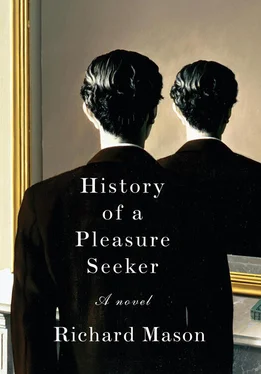So Piet was invited — not to the dinner, but to the dance that followed.
“You lucky bastard,” was Didier’s verdict. And the next day, when Piet received a check from Maarten “for shoes and a tailcoat; ask the women what you need,” he felt very lucky indeed. He spent the money in a darkly paneled shop on the Kalverstraat and enjoyed the experience immensely, for it was the first time he had ever bought a brand-new suit of clothes.
On the night of the ball he dined on sandwiches in his room and listened to the sounds of merriment drifting from below in a state of mounting excitement. Maarten Vermeulen-Sickerts owned an interest in the Café Royal in London, and had brought that establishment’s orchestra over in staterooms on the Queen of Holland . The music they played was modern and wildly glamorous. He went down, resolved to conquer, and the first person he countered was Louisa.
“Well, well, Mr. Barol.”
“Good evening, Miss Vermeulen-Sickerts.”
Louisa was dressed in aquamarine, with diamond pins in her hair. It was only when she moved that he saw silk trousers beneath her overskirt of metallic silver lace. The sight shocked him. “I like to move freely when I dance,” she said sharply, as if he had challenged her on this point; and before he could make a compliment of it she had sauntered into the crush. He lacked the courage to follow her and went instead to get a glass of champagne from Didier.
“This is the night to find yourself a rich wife,” his friend remarked, staring straight ahead.
This idea had occurred to Piet, but the thought of what Louisa Vermeulen-Sickerts would say if he pursued any of her friends made him desist. He believed, in any case, that he could earn large sums of money on his own and did not need to marry it. He drained the champagne so quickly it stung his throat, then followed the band’s riotous summons to the dance floor.
Nina Barol had taught Piet to dance and he was good at it. Conscious that Jacobina was there to observe him he chose the ugliest of the four girls watching the revelers from a gilt sofa and asked whether she would give him the honor. The young lady was so astonished to be selected that for a moment she gaped at him, and his stomach tightened with fear that he had broken one of the invisible rules of the rich and would be refused. But he had not. They danced the waltz and then another; and then, seeing a young woman with fine dark down on her upper lip, to whom Jacobina could not possibly object, Piet extricated himself and asked if she would care to polka with him.
Observing Piet’s selection of neglected partners, Maarten took his choices as further evidence of innate nobility. Jacobina watched him too and the prickings of jealousy that had made her laugh sound hollow all evening subsided. Constance’s friend Myrthe Janssen said: “Who is that divine man who dances only with ugly women? Do you pay him, my dear?” To which Constance replied, after a moment’s hesitation, “As it happens, yes. But not for the reason you suggest. He’s Egbert’s tutor.”
“Adorable.”
“I suppose. Rather a dry fish. He’s terrifically sensible.”
“Sensible men don’t dance like that, darling.” And Myrthe, who had a beautiful figure and a mass of natural blond curls and was used, like Constance, to getting her way with men, did her best to catch Piet’s eye but did so in vain.
The band took a break a little after midnight. Piet broke free of his companion and went out into the velvet dark of the garden, in which the smell of the canals had been sweetened, if not quite obliterated, by banks of hothouse roses. He took with him a glass of champagne and drank it beneath a sky thickly spattered with stars. His shirt front was wet from dancing. As he stood in the cool air, a sense of superb well-being settled over him. With it came a surge of love — for the Vermeulen-Sickertses, who had given him a pass to this enchanting world; for life, and the splendors of standing alone in a rose-filled garden; for his mother and all she had taught him.
His conscience reminded him that his adventures with Jacobina were hardly consistent with affection for her husband; but in fact the contradiction troubled him less with each passing day, and two glasses of champagne were sufficient to still it entirely tonight. She did not, after all, permit him to take any but the essential liberties, and he approved of his self-restraint in not pressing the matter. He thought of her as she had been the afternoon before, almost unconscious with pleasure on her aunt’s chaise longue, and grinned broadly. Then the orchestra struck up again and he turned towards the sound, resolved that this time he would not only dance, he would speak — as any equal would.
He entered the ballroom to find Constance and Louisa at the center of a crowd and loitered at its edges.
“When my grandfather went to New York in ’42,” a young man with straggling mustaches was saying, “it took three months to make the crossing. When I went on the Celtic in ’03, it took eleven days.”
“Took me six days on the Kaiser Wilhelm der Grosse ,” said another, who had bright pink cheeks. “Steam triple-expansion engines geared to twin screw. But I must say I prefer the Amerika . First ship to have an elevator in first class.”
“Damn elevators. What matters is the food. I went on the Kronprinzessin Cecilie last year. The restaurant has a fish tank so you can choose your dinner. I ate nothing but lobster for five days.”
“Lobster!” cried Constance, with a significant glance at her sister. “I prefer apples.”
“Bread and butter,” said Louisa, “is all I need.”
“Chocolate, my dears, for every meal,” remarked Myrthe Janssen.
“Dreamlike, to have chocolate for every meal,” said another young woman.
Only the faintest trace of a raised eyebrow from Didier, who was serving them drinks, alerted Piet to the commencement of the alphabet game. Lacking such coded assistance, the young stags rattled on boastfully. They discussed the charms of rival liners while their opinions were elicited on English engines, and French cooking, and glamour , and whether or not a suite on a Loire Lines Château of the Atlantic was a close approximation of heaven .
Now it was Constance’s turn. She hesitated a moment and then said: “Investment. Who provides the investment for these ships?”
This was a topic on which the pink-cheeked gentleman, whose name was Norbert Breitner, and whose father was chairman of the Holland-America Line, had been eager to hold forth for some time. “The big competition’s between the Germans and the English, of course,” he explained with condescension. “No sooner has one country produced the biggest, fastest ship afloat, but the other must outdo it. When J. P. Morgan was trying to gain control of Cunard, the British government offered enormous subsidies if the company would remain independent and build the two biggest ships the world has ever known. The first one’s called the Lusitania . She’s well over thirty-one thousand gross tons. She’ll be in service by the autumn.”
“Of course,” interjected his mustachioed friend, “the small print says they must be convertible for war use, in the event of a conflict.”
“ J . P. Morgan,” said Louisa, stressing the first initial, “was in the box next to ours at Beyreuth last year.”
“ King of Wall Street, surely,” added Myrthe.
“ Lusitania ’s going to be the world’s grandest ship,” said another young lady. “My parents have already booked passage on her—”
“ Maiden voyage!” interrupted Louisa, in English and out of turn; and to the surprise of the two young men the girls around them burst into hysterical laughter.
Читать дальше












